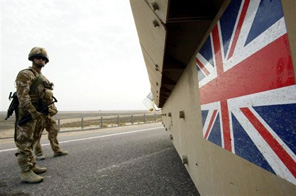UK to begin Iraq war probe
LONDON: A long-awaited inquiry into Britain's involvement in the Iraq war was due to open Thursday, six years after then premier Tony Blair's controversial decision to back the US-led invasion.
Blair has vowed to cooperate "fully" with the probe, announced by Prime Minister Gordon Brown last month to honour a pledge to hold an inquiry once Britain's soldiers have pulled out of Iraq. Critics hope the inquiry, which also covers the periods before and after the 2003 invasion, will shed light on alleged manipulation of intelligence to justify going to war alongside then president George W. Bush.
"Public confidence in government was badly hit by the murky and disastrous decisions taken in the run-up to the Iraq war, said Nick Harvey of the Liberal Democrats, the only mainstream party to have opposed the war.
"If there is to be any hope of rebuilding public trust, it is essential that the vast majority of this inquiry is held in public.
Brown was forced to do a U-turn after initially announcing that the inquiry would be held in private, provoking angry claims that it would produce a whitewash -- a criticism levelled at one of the two previous probes.
Inquiry chairman Sir John Chilcott, who was due to set out the terms of reference of the probe on Thursday, subsequently said he wants to hold as many sessions as possible in public, to which Brown agreed.
The prime minister also had to backtrack on an initial pledge that the probe would not "apportion blame," with Foreign Secretary David Miliband telling MPs it could "praise or blame whoever it likes." Chilcott, a former top civil servant, will be backed by a four-strong panel holding the inquiry, which will cover events from the summer of 2001 up to July 2009 and is expected to take around a year. Critics have jumped on the length of the probe, noting that its conclusions will not be known before elections due by next June -- meaning that any embarrassing findings would not impact on Brown's chances of staying in power.
Brown, who was chancellor in Blair's government at the time of the war before succeeding him as premier in June 2007, is in any case widely tipped to be defeated by opposition leader David Cameron, according to polls.
But Blair could also face some tough questions about his decision, which drew widespread public anger and mass demonstrations in the run-up to the war, as well as provoking a serious political rift within Europe.
The ex-premier's spokesman said when the inquiry was announced: "It is for Sir John Chilcott and the prime minister to agree the format of the inquiry and of course Mr. Blair will fully cooperate with whatever they agree." There have already been two official probes into elements surrounding the run-up to the invasion to topple Saddam Hussein's regime.
The 2004 Hutton inquiry looked at the suicide of David Kelly, a government scientist named as the possible source of a BBC report claiming the government "sexed up" a dossier on Iraq's military capability.
Meanwhile the Butler inquiry, which reported the same year, highlighted failings in intelligence over whether Saddam had weapons of mass destruction. Chilcott was a member of the panel which oversaw that inquiry.






